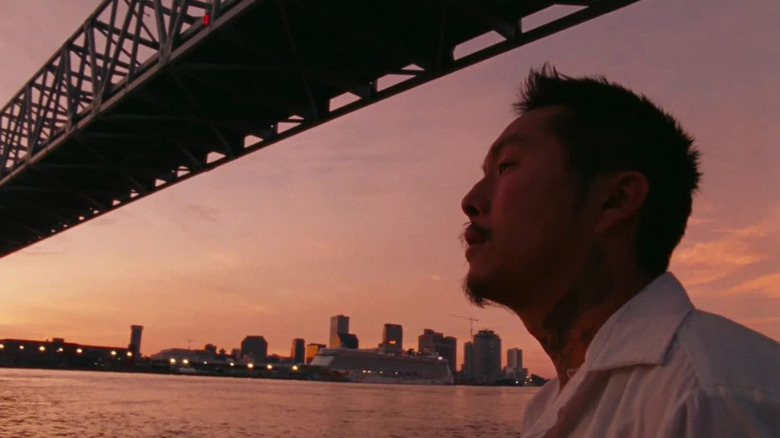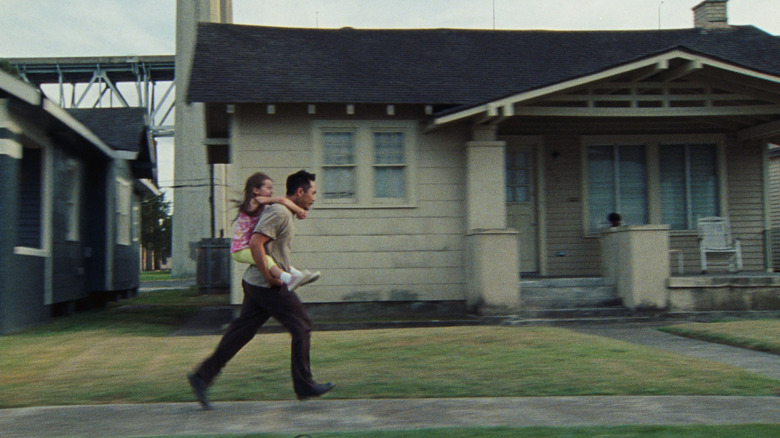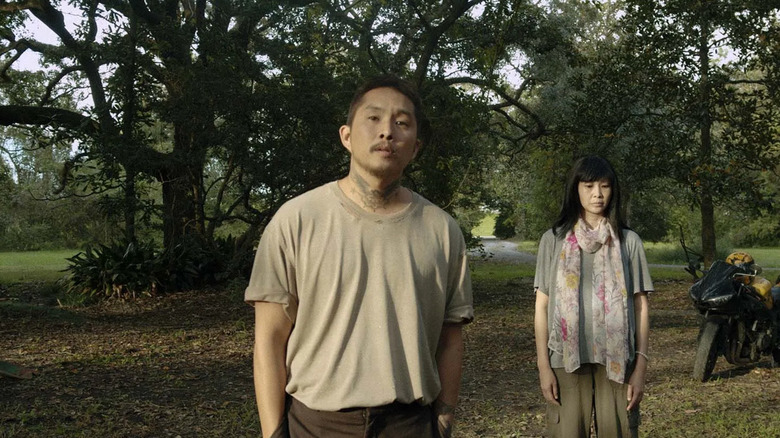Blue Bayou's Southern Setting Served The Story In More Ways Than One
Who decides what it is to be American? It's this question that Justin Chon poses with the blistering "Blue Bayou," his third independent feature. Chon was probably once best known as the quirky Asian friend in films like "Twilight" or "21 & Over," but he's since carved a new niche for himself in Hollywood — and he's striving to do the same for the Asian American community.
The plot of "Blue Bayou" is about as straightforward as they come, though no less devastating: the film follows Antonio (Chon), an adoptee from South Korea who suddenly comes face to face with deportation. The fact that he was raised in the U.S. — and has since built a life with his girlfriend Kathy (Alicia Vikander) and her young daughter — does very little to help his case. Antonio still has to fight for the right to stay in the only country he's ever known, to prove that he belongs there. It's a story made all the more intriguing by the fact that Antonio doesn't necessarily fit the image of the archetypal Asian American: He's decked in tattoos from head to toe and takes up petty crime to make ends meet. Most notably, his Baton Rouge accent is unmistakable.
Of course, that's to be expected of someone who's grown up all their life in Louisiana. It's entirely possible to run into someone like Antonio in real life, but how often is someone like Antonio — Asian, working class, Southern — the subject of his own story?
The spirit of the city
For "Blue Bayou," the setting was just as important as its story. Chon's previous films, particularly "Gook" and "Ms. Purple," were set entirely in Southern California, where the filmmaker was born and raised. Even then, location was necessary to address a particular issue. "'Gook' had to be in LA because it's about the LA riots," Chon told GQ. "'Ms. Purple' also had to be in LA because it's about people getting left behind in a gentrifying Koreatown." What was it about Louisiana that prompted Chon to tell his latest story there?
For one, there was an appeal to depicting a Southern character, especially one of Asian descent. "I had never seen an Asian American with a Southern accent played in a particularly significant way in film," Chon told the LA Times. It was also important that Antonio be "a real three-dimensional human, not some saint," and New Orleans seemed to echo that sentiment to Chon."It's a very resilient city. Even recently they dealt with a hurricane and they still find a way to keep their spirit alive. That really represented Antonio."
Setting "Blue Bayou" in Louisiana also meant shedding light on the Vietnamese diaspora in the South. "There's a huge Vietnamese population in Louisiana, because a lot of them were relocated there and were refugees after the Vietnam War," Chon explained. "It was important that I put ["Blue Bayou"] in New Orleans because I always knew I wanted a Vietnamese storyline, and I wanted to get to adjacent Asian cultures in one film."
A mirror image
A key element to Antonio's journey is his relationship to Parker (Linh Dan Pham), a Vietnamese American woman battling cancer. Their bond — and Parker's plight — puts Antonio's own struggles into clearer perspective, making her presence a necessary force within the film. "I felt like Parker served as a mirror to Antonio," Chon told /Film's Hoai-Tran Bui. "They come into each other's lives at a point of he's having a death of being an American and she's having a physical death. I thought that there was something poetic about that."
Antonio and Parker's bond is also a refreshing intersection for two communities that are, for one reason or another, rarely allowed to intersect in film. "I think a lot of times in film, it just feels like it has to be a Korean American film, or British Chinese, or Vietnamese American," Chon mused to GQ. "It's quite restrictive and categorical in the way that we're separating ourselves. It makes no sense to me." It was important that the relationships between the characters in "Blue Bayou" echoed those that Chon had experienced in real life, especially with people in adjacent cultures. Bringing Antonio and Parker together in a place like New Orleans, known as much for its individualism as it is for its strong community, was important too. "New Orleans is like nowhere else in America, so there's an irony in the fact that it doesn't feel like America."
New Orleans' otherworldy appeal echoes the sentiment behind "Blue Bayou" in so many ways. The city may not be the first that comes to mind when you think of America, and it might be the same for characters like Antonio or Parker, or even Vikander's Kathy. That they share as many differences as they do similarities helps to further stretch the expectation of what it is to be American, and it's just one of the things that makes Chon's film such a surprising experience.


